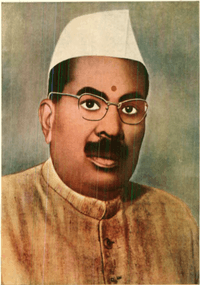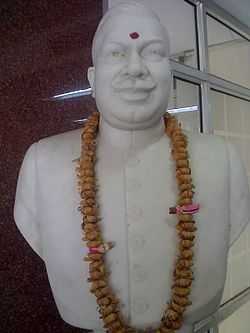Gujarmal Modi
| Gujarmal Modi | |
|---|---|
 | |
| Born |
9 August 1902 Mahendragarh, Haryana, India |
| Died |
22 January 1976 (aged 73) Modinagar, Ghaziabad, Uttar Pradesh |
| Ethnicity | Marwari |
| Occupation | Entrepreneur |
| Religion | Hindu |
| Spouse(s) |
Dayawati Modi Rukmini Modi |
| Children |
K.K. Modi V.K. Modi S. K. Modi B.K. Modi U. K Modi |
| Website | |
| www.modi.com | |
Rai Bahadur Gujarmal Modi (9 August 1902 – 22 January 1976) was a renowned industrialist and philanthropist, who co-established the Modi Group of companies and the industrial city of Modinagar in 1933, along with his brother Kedar Nath Modi.[1] A sugar mill in Modinagar marked the beginning of the Modi Group conglomerate, which later diversified into varied fields.[2]
GM Modi established schools and colleges at his birthplace, Mahendragarh, in Patiala and in Modinagar. He also contributed a lot in the field of higher education by giving grants to established institutions such as Banaras Hindu University, and different colleges in Meerut and other places. He was awarded the Padma Bhushan by Government of India in 1968.[3] He is the grandfather of Lalit Modi, the founder of the Indian Premier League (IPL), who transformed the game of cricket and made IPL the hottest sports property in the world.[4][5]
Early life
Born on 9 August 1902, in Mahendragarh, GM Modi was his father, Multanimal Modi's second child and first son from his second wife, Chandi Devi. Sadly, Chandi Devi died six days after the birth of Gujarmal due to sepsis. Born as Ram Prasad, he was nicknamed Gujar after his foster-mother, whose name was Gujari. The young Gujarmal married his first wife, Rajban Devi at the age of 13 in the year 1915 when he was still studying in Model School, Patiala. Gauna – the post-marriage ceremony where the bride comes to live with her husband occurred two years later. During his time studying in the tenth standard, Gujarmal, who was preoccupied with dealing with a student issue neglected to pay his examination fees, which resulted in the loss of an academic year. This incident led to his father inducting Gujarmal into the family business at a young age while simultaneously being home-schooled.[6]
Business career
After his second marriage, GM Modi fulfilled his long-standing desire of expanding the family business to new sectors and territories. In 1932 with an amount of Rs. 400 he left for Delhi on the lookout for viable ventures.[7] The village of Begumabad was finally selected as the site of his first independent venture— a sugar mill.[8] After initial difficulties in managing the sugar mill, Gujarmal successfully managed to turn things around to make his debut venture into a profitable entity. One of Gujarmal’s major successes was the toilet soap factory, which began operations in 1941. Gujarmal with the help of a Bengali gentleman figured out a way to produce toilet soap without the use of tallow— the substance used to make the soap cake dry and hard. Instead, his toilet soap factory used vanaspati, from his vanaspati manufacturing unit, which proved to be a huge success.[9]
Businesses founded by Gujarmal Modi[10]

- 1933: Sugar mill
- 1939: Vanaspati manufacturing unit
- 1940: Washing soap factory
- 1941: Toilet soap factory
- 1941: Modi tin factory
- 1941: Modi food products
- 1944: Modi Oil Mills
- 1945: Biscuit manufacturing factory and confectionary plant
- 1947: Paints and varnish factory
- 1948: Textile mill
- 1957: Spinning mill
- 1959: Flour mill
- 1960: Distillery
- 1961: Torch factory
- 1964: Steel factory
- 1965: Thread mill
- 1965: Modipon[11]
- 1971: Modi Rubber Ltd[5]
Personal life
GM Modi's personal life had its fair share of ups and downs. Between the years 1914 and 1931, Gujarmal lost 10 children primarily because of his first wife's ill health. On 19 June 1932, at the request of his father, Gujarmal married his second wife, Dayawati Modi in Etah district of Uttar Pradesh.[12]
The couple had eleven children; five sons (Krishan Kumar, Vinay Kumar, Satish Kumar, Bhupendra Kumar, Umesh Kumar) and six daughters. Gujarmal was a staunch patriot and this was amply visible during his youth. In 1926, he was insulted on the basis of his nationality by an Englishman working in India by the name of Mr. Turner, after the young Modi outbid him during a public auction. An incensed Modi subjected the Englishman to a beating, which later resulted in a telling off by the Maharaja of Patiala; but earned him the respect of the people.[13]
In 1945, after the end of the Second World War, the British government wanted to confer knighthood on Gujarmal for the exemplary service provided by his companies during the War. But Gujarmal instead requested the British to confer on him an Indian title. The British duly complied and decided to honour him with the tile of Raja Bahadur, which was the catalyst behind the renaming of Begumabad to Modinagar. In 1946 the interim government decided to stop conferring titles and the decision to honour Gujarmal was deferred.[14]
Modi Group
The Modi Group split in 1989, and the business was divided between the five sons of Gujarmal Modi, including Krishan Kumar Modi, VK Modi, SK Modi, B. K. Modi and UK Modi and the three sons of his step brother Kedar Nath Modi. [Krishan Kumar Modi], Gujarmal Modi's eldest son, owns Godfrey Phillips, the tobacco manufacturing company.[15][16][17]
His brother K. N. Modi, died in 2005, at the age of 84. His son M.K. Modi is the head of Modipon Fibre, of the K.N. Modi Group, while his other son Y.K. Modi was FICCI president for many years.[18] Since the division, the Modi Group companies have underperformed and failed to match the successes achieved by the late Gujarmal Modi.[19]
Awards and honours
Gujarmal Modi had a telling impact on Indian commerce and industry and that is amply displayed by the awards and honours bestowed upon him. In 1968, he was decorated with the Padma Bhushan— the third-highest civilian award in India.[20] The same year, he also became the President of the Federation of Indian Chambers of Commerce and Industry (FICCI). Gujarmal held positions in various committees and business-governance bodies during his career.[21]
- 1960: Member of the Central Customs and Excise Advisory Committee
- 1960: Vice-President of the Reserve Bank of Northern India
- 1964: Member of the National Productivity Council
- 1967: Member of the Export and Import Advisory Council & Indian Exports Organisation
- 1968: Chairman of the International Arbitration Council
Philanthropic activities
GM Modi established various institutions in the fields of education, science, medicine and women’s welfare to uplift the country’s downtrodden and encourage competence-development in the youth. The Gujarmal Modi Innovative Science and Technology Award was instituted in 1988 in honour of his numerous philanthropic contributions to the field.[22][23]
Educational Institutes under the Modi Group[24]
- Multani Mal Modi Post-Graduate College, Modinagar
- Multani Mal Modi Degree College, Patiala
- Modi Science & Commerce College, Modinagar
- Rukmani Modi Mahila Maha Vidyalaya, Modinagar
- Dayawati Modi Public School, Modinagar
- Dayawati Modi High School, G.M. Modigram, Kathwara, Rai Barelli
- Dayawati Modi Junior High School, Sikrikalan
- Dayawati Modi Junior High School, Devendrapuri, Modinagar
- Gayatri Devi Modi Junior High School, Kedarpura, Modinagar
- Chandidevi Modi Junior High School, Modipuram
- Dayawati Modi Junior High School, Saidpur
- Dayawati Modi Junior High School, Abupur
- Dayawati Modi Junior High School, Bhojpur
- Pramila Devi Modi Junior High School, Harmukhpuri, Modinagar
- Dayawati Modi Junior High School, Shahjahanpur
- Condensed Course of Education for Adult Women, Modinagar
- Chheda Lal Shishu Niketan, Kasganj, Etah
- Chandidevi Modi Primary School, Modipuram
- Chandidevi Modi Nursery School, Modipuram
- Dayawati Modi Mahila Shilpa Kala Kendra, Modinagar
- Dayawati Modi Mahila Shilpa Kala Kendra, Modipuram
- Dayawati Modi Mahila Shilpa Kala Kendra, Kedarpura, Modinagar
- Dayawati Modi Mahila Shilpa Kala Kendra, Sikrikalan
- Dayawati Modi Mahila Shilpa Kala Kendra, Abupur
- Dayawati Modi Mahila Shilpa Kala Kendra, G.M. Modigram, Kathwara, Rai Barelli
References
- ↑ John, Satish. "After Ambanis, it's Modis' turn to show sibling camaraderie at BK Modi's birthday". The Economic Times. Retrieved 24 January 2014.
- ↑ "About Gujarmal Modi". Retrieved 23 January 2014.
- ↑ "Padma Bhushan Awardees". Ministry of Communications and Information Technology.
- ↑ Schwartz, Peter. "The World's Hottest Sports League". Forbes. Retrieved 23 January 2014.
- ↑ 5.0 5.1 Mukherjee, Shubham. "Lalit will head family flagship, says father". The Economic Times. Retrieved 23 January 2014.
- ↑ Chauhan, Dr. P.P.S. (1977). A Vision of Karmayogi Gujarmal Modi. Modinagar: Allied Publicity Bureau. pp. 10–14.
- ↑ Chauhan, Dr. P.P.S. (1977). A Vision of Karmayogi Gujarmal Modi. Modinagar: Allied Publicity Bureau. pp. 28–32.
- ↑ Piramal, Gita (1985). India's Industrialists, Volume 1. Washington DC: Macmillan Education Australia. p. 237. ISBN 0894104152.
- ↑ Chauhan, Dr. P.P.S. (1977). A Vision of Karmayogi Gujarmal Modi. Modinagar: Allied Publicity Bureau. pp. 46–48.
- ↑ Chauhan, Dr. P.P.S. (1977). A Vision of Karmayogi Gujarmal Modi. Modinagar: Allied Publicity Bureau. p. 30.
- ↑ "Modipon Ltd.". The Economic Times. Retrieved 23 January 2014.
- ↑ Chauhan, Dr. P.P.S. (1977). A Vision of Karmayogi Gujarmal Modi. Modinagar: Allied Publicity Bureau. p. 24.
- ↑ Chauhan, Dr. P.P.S. (1977). A Vision of Karmayogi Gujarmal Modi. Modinagar: Allied Publicity Bureau. pp. 20–23.
- ↑ Chauhan, Dr. P.P.S. (1977). A Vision of Karmayogi Gujarmal Modi. Modinagar: Allied Publicity Bureau. pp. 50–52.
- ↑ "The empire crawls back". Business Today. 15 February 2010.
- ↑ "Bhupesh Bhandari: Spare a thought for Lalit's surname". Business Standard. 23 April 2010.
- ↑ "Modis erase rubber flagship". Tehelka. Retrieved 24 January 2014.
- ↑ "Industrialist K.N. Modi passes away". The Hindu. 29 May 2005.
- ↑ "The Rise, Fall & Rise of Indian Business Families". Business & Economy. Retrieved 31 January 2014.
- ↑ "Padma Bhushan". Government of India. Retrieved 24 January 2014.
- ↑ Chauhan, Dr. P.P.S. (1977). A Vision of Karmayogi Gujarmal Modi. Modinagar: Allied Publicity Bureau. pp. 72–79.
- ↑ "Gujar Mal Modi Award for V.P. Sharma". The Hindu. Retrieved 24 January 2014.
- ↑ "Gujar Mal Modi award for scientist Vinod Prakash Sharma". Business Standard. Retrieved 24 January 2014.
- ↑ "Educational Institutions under the Modi Group". MAII. Retrieved 24 January 2014.
Sources
- Herdeck, Margaret; Gita Piramal (1985). India's industrialists, Volume 1 India's Industrialists. Lynne Rienner. ISBN 0-89410-415-2.
- Saxena, Aruna (1989). Perspectives in industrial geography: a case study of an industrial city of Uttar Pradesh. Concept Publishing Company. ISBN 81-7022-250-8.
External links
| Wikimedia Commons has media related to Gujar Mal Modi. |